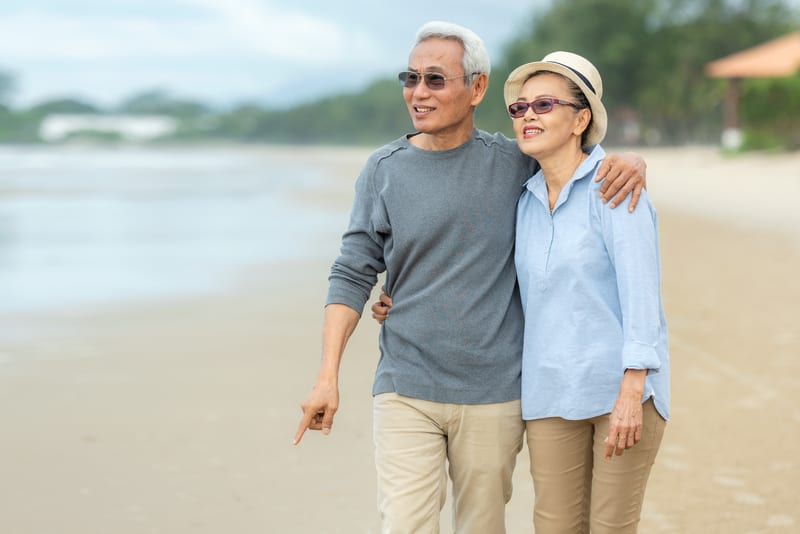After two years of Covid caution and risk levels that fluctuated like an island-hopping helicopter, travel lovers may be wondering if it’s safe to venture out again – especially if they are among the more vulnerable of our population, such as seniors and the immunocompromised. For those who are cautious about Covid travel but willing to take a risk, there are ways to be safe while still enjoying travel.
What are current regulations for Covid travel?
Because regulations vary widely among domestic and international locales and because of the ever-changing nature of the pandemic, it is vital to check the most current rules and regulations for your mode of transportation and at your destination. No one wants to be surprised with requirements that ruin a trip or experience a surprise mandatory quarantine upon arrival!
Masks
- Currently, the TSA (Transportation Security Administration) has mandated that all users of public transportation (including planes, buses, and trains) continue to use a facemask. Masks must also be worn in airports. This mandate has been extended to April 18, 2022.
- Check with your airline to find out their required mask regulations. Many airlines do not allow fabric face masks, including bandannas, scarves, gaiters, collars, or even single-layer masks. Some masks with valves or slits are also not allowed. The most effective masks are N95 and KN95 masks.
Vaccinations
- Not only might some places you visit during Covid travel require you to be vaccinated (and boosted), you may also need to carry verified proof of vaccination.
- Because different countries (and even some American states) have different regulations, be sure to check with your destination to confirm their requirements. In addition to the government policies, check with specific hotel, bars, shops, entertainment venues, etc. that you plan to visit, as they may have different masking and vaccine requirements. Large events, performances, and concerts especially often have stringent requirements, so know before you go.
- There are many countries that unvaccinated travelers may visit. Currently, Greece, Spain, Turkey, Mexico, Ireland, Italy, and the Bahamas are all locales that do not require vaccination for entry. Each country has its own requirements for testing, so be sure to check with the government website of your desired country before finalizing plans to ensure that regulations have not changed.
Testing
- Opt for rapid antigen tests, since tests will often be required within 24 hours of traveling and you will not have time to wait on PCR results.
- If you recently recovered from COVID-19, you may be able to use documentation of recovery from COVID-19 (your positive COVID-19 viral test result taken no more than 90 days before the flight’s departure from a foreign country and a letter from a licensed healthcare provider or a public health official stating that you were cleared to travel).
- Keep in mind that you will likely have to pay for testing out of pocket if you are traveling internationally before reentering the United States. Look for convenient testing sites at your destination, and budget accordingly for testing.
Where can I travel?
The places you visit during Covid travel will depend on your risk (as with seniors and the immunocompromised), your tolerance for risk, and your vaccination status. Check the Center for Disease Control and Prevention website for a list of travel recommendations by destination. This listing classifies countries based on their risk assessment level for COVID-19. This is an ever-changing list, so be sure to check in frequently on your desired destination, especially if you begin planning well in advance of your travel dates.
How do I prepare for international travel?

Keep in mind when you make travel arrangements that you would need to have flexibility and a backup plan in case you contract COVID-19 while in another country.
Regardless of where you travel, all air passengers 2 years of age or older traveling to the US (which includes re-entry for Americans) will be required to present a negative COVID-19 test no more than one day before entering. Alternatively, if you have had COVID, you may present an acceptable document of recovery. This documentation will include a positive COVID-19 test from within the previous 90 days, and a letter from your doctor or health department giving clearance to travel.
Bottom line
The CDC maintains the most up-to-date guidance for U.S. travelers, worth reviewing before departure.
Finally, use common sense. Those who are immunocompromised, seniors, or highly concerned about the risk can choose to drive to the destination and forego the increased risk of public transportation. They can avoid high-traffic areas, maintain a six-foot distance from others when possible, and wear an effective face mask when in public. Practice frequent handwashing or use hand sanitizer after coming in contact with high-touch areas.
These practices may help prevent not only COVID-19, but other communicable diseases as well. And they help protect fellow travelers, especially those who are medically vulnerable or unable to get vaccinated.
Safe travels!

